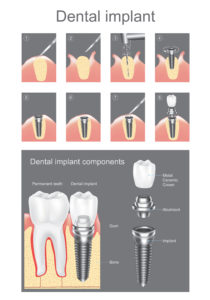August 15, 2018
If you’re thinking about using dental implants as your tooth replacement option after being impacted by severe gum disease, you should consider your options carefully. There are many dental specialties whose training qualifies them to place your implants, but they are not all equal. Some specialties receive more training with specific procedures than others, which is why you might want to talk to a periodontist about using dental implants as part of your gum disease treatment plan.
Extra Training and Expertise
Periodontists are specialists in periodontal diseases, including gingivitis and other gum diseases. They also learn extensively about inflammation in the mouth and its impacts on oral health, so they can be useful experts to talk to after an oral trauma or when other conditions are impacting oral health due to inflammation. In addition to learning more about the theory and practice of treating periodontal disease than traditional dentists, periodontists also receive extensive training in the placement of dental implants.
Why Dental Implants?
There are a few tooth replacement options open to patients with gum disease, so why do periodontists receive extensive training with dental implants?
- Implants preserve jawbone tissue and help reinforce healthy gums
- They are made of biocompatible materials to eliminate implant-caused inflammation
- They preserve a patient’s natural smile
- Dental Implants are permanent
All these features make dental implants the best simulation of natural teeth from the body’s point-of-view. That’s why periodontists recommend them to patients who lose teeth due to gum disease whenever possible.
Do You Need Implants?
If you are wondering about your options and you’re dealing with serious gum disease that includes receding gums and possibly tooth loss, you need to talk to a periodontist in Southern Pines, NC. Contact our team today to make an appointment for a consultation with Dr. Van Scoyoc, and learn more about what dental implants can do as a part of your overall strategy for overcoming periodontal disease.
